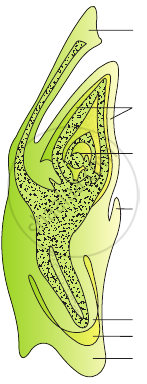Advertisements
Advertisements
Question
Differentiate between coleoptile and coleorrhiza.
Solution
| Coleoptile | Coleorrhiza | |
| 1. | The epicotyl bearing shoot apex and leaf primordia are enclosed in a foliar structure called coleoptile. | The radical and root cap are enclosed in a sheath called coleorrhiza. |
| 2. | Coleoptile has a terminal pore for the emergence of the first leaf. |
Coleorrhiza is a solid structure. |
| 3. | It protects the plumule during emergence from the soil. |
It does not protect the radicle during its passage into the soil. |
| 4. | It grows much beyond the grain. | After emergence from grain, it stops growing. |
| 5. | Coleoptile, after emergence from soil during germination, becomes green and does photosynthesis. | Coleorrhiza does not come out of the soil. It remains non-green. |
APPEARS IN
RELATED QUESTIONS
Differentiate between hypocotyl and epicotyl.
Write the function of the following:- Coleoptile
Write the function of the following:- Oxytocin
Explain the development of dicot embryo.
Describe the development of dicot embryo in flowering plants.
From the following identify the non endospermic seeds.
Which of the following is the role of suspensor?
The first cell of the suspensor towards the micropylar end becomes swollen and function as a ______.
During embryo development, the embryonal initial cell undergoes a transverse and two vertical divisions at right angles to each other to form ______.
From the following identify the INCORRECT statement.
In which of the following pollination occurs?
Identify the INCORRECT statement regarding post-fertilization development m flowering plants.
Flowers are highly modified ______.
The arrangement of the nuclei in a normal embryo sac in the dicot plants is ______.
The portion of embryonal axis between plumule (future shoot) and cotyledons is called ______.
Coleoptile and coleorhiza are the protective sheaths covering ______ and ______ respectively.
Endosperm is completely consumed by the developing embryo in ______.
Vivipary automatically limits the number of offsprings in a litter. How?
In the given diagram, write the names of parts shown with lines.

Match column I with Column II. The fate of various parts of the ovary.
| Column I | Column II |
| A. Ovary wall | (i) Testa |
| B. Outer integument | (ii) Stalk of the seed |
| C. Nucellus | (iii) Pericarp |
| D. Funicle | (iv) Perisperm |
Choose the correct code given below.
